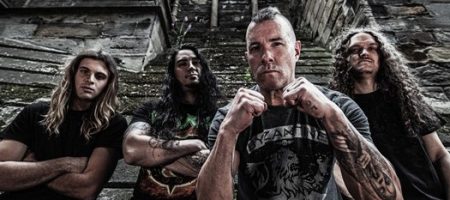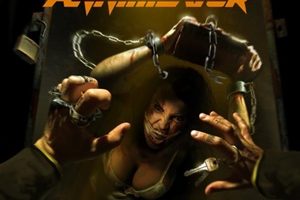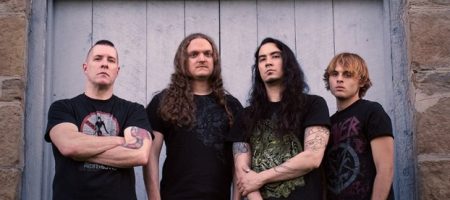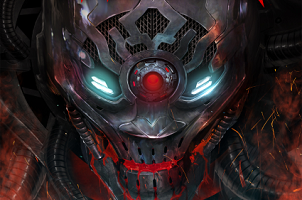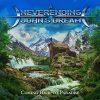Annihilator – The Demented Check In Part 1
Sunday, 12th November 2017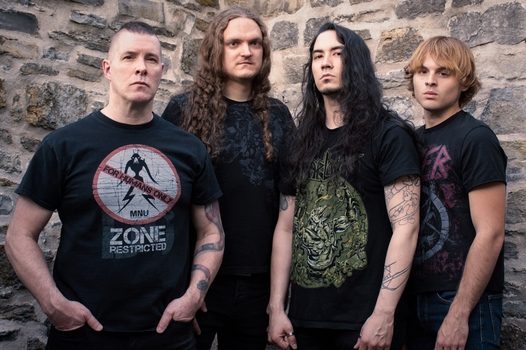
Jeff Waters is an ambassador and connoisseur of heavy metal. His guitar playing electrified the thrash community right out of the gate back in 1989 on Annihilator’s debut album Alice in Hell – precise, attacking, melodic, and exhilarating. The fact that the band is still going, performing for a second and third generation of fans, is a testament to his vision, his action, and his consistency. For the Demented is the sixteenth studio record in his vast discography – encompassing all facets of his career in terms of this batch of songwriting, even swinging back in spots to those late 80’s/early 90’s efforts that put the band on the worldwide map for thrash.
The last time we got the chance to talk to Jeff was four years previous on the Feast album cycle – but you are always guaranteed that he has plenty to discuss and stories to tell. Prepare to discover the brain-oriented lyrical content angle for the new record – how he became the music director for an all-star metal karaoke group with 70,000 Tons of Metal, and discussion of Canadian metal history plus upcoming touring action. Other tidbits not making the main hour-long interview: Jeff would consider writing an autobiography, but only after he is finished in the music business; getting Annihilator imports on Amazon for $40 per record can be ridiculously priced; he’s a sober recovering alcoholic for over 18 years; and without the outlet of metal and guitar playing, he would be a totally different person.
Dead Rhetoric: For the Demented is the new record – another Annihilator effort that showcases your diversity in terms of songwriting and abilities. Did you want to encompass some of the classic trademarks a touch more this go around, especially in songs like “Twisted Lobotomy” and “Altering the Altar” – and do you trust the creative process or find you need to schedule time so to speak for your best work these days?
Jeff Waters: Starting with the end, it’s more of a business type thing in the writing, in that I schedule it because there has been so much stuff going on with (Annihilator) for decades- almost all of it overseas. There are tours, which is great, but you have to schedule your whole life around this because your ten months and eleven months a year doing Annihilator stuff. The scheduling is business-like, but outside of playing live this is the whole fun of being a musician. Songwriting is a total love thing – it’s not work, it’s hit or miss whether you do a great job at that, you don’t know until after you are done writing and finishing a record anyway.
The last album we did was Suicide Society in 2015, and most people that stumble upon us in North America, know that most of our career has been focused on Europe so to speak. That’s where people buy our records and pay the tickets the most to go to the shows, right? The last one, while it did better than many of the previous ones before it, it was a shocker because when I did the writing for the record it was my first time back being a singer for the band in many albums. I did three other albums singing before that, but that was back in the 1990’s. When the album was done, you think like a painter, and artist, a writer, whoever you are – you create something and you usually like it, it’s very easy to think this is the best thing you’ve done in a long time. The reality and honesty hits later, and sometimes that isn’t the case. The last album sold great, the record company was happy, and the shows/tours we were offered went up for us pretty quickly- but critically I had a lot of journalists in Europe rub elbows with me and say, ‘So Waters- you kind of got away with this one.’ And I said ‘What?’. And they would say that this song sounds very much like “Damage Inc.” by Metallica, or this song sounds very Mustaine-ish. With that last record, I didn’t put a filter on (my writing), the filter of Waters the metal fan versus Waters the professional musician that’s supposed to be making music that’s at least 50% original right? So if something came out that had a little Gary Holt or Jeff Hanneman, Kerry King, or James Hetfield, I loved it and kept it. I got some flak for that, so I thought right away despite how well the album did for us, I’m not going to do that again.
This time I brought in my bass player for a few years, Rich Hinks from the UK. He sat with me while I did this bloody writing for the new album, because he’s a big classic/thrash metal fan from the 1980’s. I needed him to look at me and say one of two things, ‘no’ or ‘yes’ (laughs). I would sit there and write and write with him, he was writing with me very quickly on. He’d look me and say ‘Hanneman’, and I’d go ‘shit- that was a good riff… sounds too much like Slayer’, and I would say ‘are you sure?’. He’d say, ‘yes, Jeff- that’s Slayer, now move on’. He steered me back to the first five to eight years of Annihilator where the fan of metal was still a part of things and very strong, but I had more of my own style where people would say, ‘hey that sounds like that Annihilator guy.’ That is what Rich did for me- he brought me back to where the creativity was when it was at its peak. And that had a big influence on how the music sounded. That’s all it took to bring this back to people thinking it’s along the lines of the early Annihilator with the first four albums. You can’t go back and recreate an album or a song that you did twenty or thirty years ago. It’s usually suicide to even try and do that. I did want to steer back from the fan, and Rich steered me to the early vibe.
Dead Rhetoric: Is it tougher to drill deep into the creative part thirty years in the business?
Waters: Yes. There’s pros and cons. Annihilator started out with me making demos and the singer John Bates- he’s the guy who wrote “Alison Hell” and a song called “King of the Kill” plus a few others. Him and I together in 1984 writing songs, and then it was like ‘hey-let’s get a band together!’. It rolled for a couple of years where the musicians weren’t into it, we were teenagers and kids and people weren’t wanting to do this full-time like I wanted to, they didn’t have the drive. So I moved all the way over to the other side of Canada to Vancouver, and on the first album Alice in Hell we had instant success- the first big US tour we did with Testament in 1989, our singer Randy Rampage quits the band because he had to go back home to his job. That was a shock, and that was the day I decided this was going to be a solo project. I hired guys to do the studio work and the tours, because I didn’t want anybody to be able to ruin or stop what I wanted to do, this music. A lot of outsiders who haven’t been following us and see things on social media think I am a dictator. On tour, we are a band, it’s an equal band thing.
Dead Rhetoric: The ballad “Pieces of You” is striking, in a just world a song that would be blasting from all avenues of music programming and terrestrial radio. What can you tell us about the development of this song on the lyrical and musical fronts?
Waters: That was one of the things that Rich and I did when we were writing the music. When I would touch on a ballad, I like to write different styles. I thought we weren’t going to do a ballad this time, because we didn’t have a ballad on the first couple of records, and we didn’t need it. But, knowing my weird brain I had to figure out a way to sneak one on there. The lyrics or subject matter had to fit into the idea of the human mind or mental illness. I don’t mean it to make fun of it, just this craziness of the brain with subjects on the album from addiction to ADHD which I have, my son has that, to obsessive compulsion- everything on the record has something to do with the brain.
I wanted to sneak a ballad on there, but fool people into thinking there’s a nice love song on there and (for those) who don’t read the lyrics. I watch a lot of these silly crime stories and horror things- some of the really twisted ones I’m fascinated by. There is one story I found about a guy who basically killed his girlfriend and he was so nuts that he chopped her up into pieces and ate her in a sandwich for lunch. What can you say- my mother is not going to be proud of that song. I put something twisted, it’s a creepier and grosser Alice Cooper vibe, with a Metallica and Annihilator ballad in behind it.
Pages: 1 2











